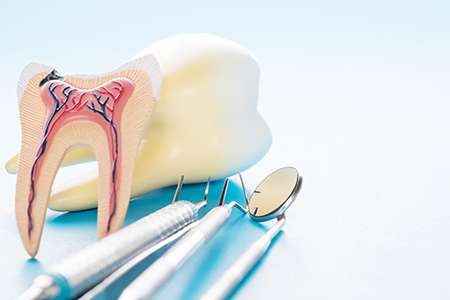
Being told you need a root canal doesn’t have to be frightening. Modern root canal therapy is a precise, widely practiced dental procedure designed to relieve pain, remove infection, and preserve your natural tooth whenever possible. In many cases it restores comfort and function with minimal disruption to your daily life.
At the office of Cherokee Smiles Dental, we combine up-to-date techniques with careful patient communication so you understand each step before treatment begins. Our approach focuses on protecting oral health while keeping you comfortable and informed throughout the process.
Rather than removing a damaged tooth, saving it with root canal therapy helps maintain normal chewing function, preserves adjacent teeth, and supports the underlying jawbone. When a tooth’s internal tissues are compromised but the outer structure remains largely intact, endodontic treatment often offers the most reliable path to long-term stability.
Root canal therapy is aimed at removing diseased or dead pulp tissue from inside the tooth, disinfecting the root canals, and sealing them to prevent reinfection. Once the canals are treated and the tooth restored, most treated teeth can continue to function for many years when cared for properly.
Choosing to retain a natural tooth whenever clinically appropriate also reduces the need for more invasive restorative options later on. By addressing the problem early, root canal therapy helps preserve your bite, speech, and the overall balance of your smile.

The center of each tooth contains the dental pulp: connective tissue, nerves, and small blood vessels that are essential while a tooth is developing. After a tooth is fully formed, those tissues are no longer required for everyday function—but they still respond to threats like decay, trauma, or bacterial invasion. When the pulp becomes inflamed or infected, symptoms often follow.
Common warning signs include ongoing or severe tooth pain (especially pain that wakes you at night), heightened sensitivity to hot or cold that lingers, pain when biting or chewing, visible darkening of a tooth, swelling of the gums, or increasing mobility of a tooth. Any of these symptoms warrant prompt assessment to determine whether root canal therapy is needed.
Not every tooth that is infected causes obvious pain; some problems are first found on X-rays during a routine exam because infection can progress quietly at the root tip. That’s why regular dental checkups and radiographs are important—early detection often enables simpler, more predictable treatment.
Addressing an infected or damaged tooth without delay reduces the chance that the problem will worsen and affect neighboring teeth or bone. An untreated dental infection can expand, cause more intense pain, form an abscess, or lead to more extensive treatment needs later on. Timely root canal therapy typically limits the extent of damage and helps protect overall oral health.
Delaying treatment can also narrow your restorative choices. A tooth that might have been saved with a straightforward root canal and crown could, if neglected, become so compromised that extraction becomes the only viable option. Acting early preserves more treatment possibilities and often shortens recovery time.
When your dentist recommends root canal therapy, it’s because clinical findings and imaging suggest that removing the inflamed or infected pulp is the best way to resolve the issue while maintaining the integrity of your smile. Prompt evaluation ensures you understand the diagnosis and the treatment pathway available.
Contemporary root canal treatment is performed under local anesthesia so the procedure itself is usually comfortable. After numbing, the dentist creates a small access opening in the tooth to reach the root canals. Using specialized instruments and magnification, the canals are cleaned, shaped, and disinfected to remove infected tissue and bacteria.
The number and complexity of canals vary from tooth to tooth; some treatments are completed in a single visit while others may require more than one appointment to ensure thorough disinfection, particularly when active infection is present. Biocompatible filling materials are used to seal the canals, which helps prevent recontamination.
After the endodontic portion is finished, the tooth will need a durable restoration—often a crown—to restore full function and protect the remaining tooth structure from fracture. Your dental team will explain the recommended restorative timeline and options so you can return to normal chewing and appearance with confidence.

After treatment, it’s normal to experience mild tenderness or sensitivity for a few days as surrounding tissues heal. Over-the-counter pain relievers are usually sufficient to manage discomfort, and your dentist will advise you if a prescription is appropriate. Avoiding hard or sticky foods on the treated tooth until the final restoration is placed helps prevent complications.
Good oral hygiene—brushing twice daily, flossing gently, and attending regular dental checkups—supports healing and helps the treated tooth remain healthy. If antibiotics have been prescribed for a spreading infection, it’s important to complete the course exactly as instructed to fully resolve the infection.
A permanent crown or other definitive restoration is typically recommended after root canal therapy to reinforce the tooth and restore its normal function. With proper restoration and ongoing care, a root canal–treated tooth can remain serviceable for many years, often for the remainder of a patient’s life.
The team at Cherokee Smiles Dental is committed to guiding you through diagnosis, treatment, and recovery so you can make informed choices about your oral health. If you have questions about root canals or think you may need evaluation, please contact us for more information.

A root canal procedure is the best way to save a tooth that has been damaged by decay or injury and preserve your natural smile. The alternative is an extraction and treatment to replace the tooth. While at times a tooth is non-restorable and an extraction is the only option, when possible, it’s best to try and save your natural tooth. With proper care, a tooth with root canal therapy can serve your smile well for many years to come.
Despite lingering myths from before the age of modern dental anesthesia and technology, having a root canal procedure today is as routine and comfortable as visiting the dentist for a filling. While the procedure is performed under local anesthesia with your tooth completely numbed, we can also discuss options in dental sedation.
Whether the symptoms of a dental infection subside after a course of antibiotics, a draining abscess provides you with some temporary pain relief, or a tooth with radiographic evidence of pathology has not yet developed symptoms, it’s essential, before an infection worsens or occurs, to have a root canal procedure performed. In this way, the tooth can be disinfected, filled, and sealed to protect your health and avoid further problems.
If you have sustained a dental injury, have a toothache, jaw pain, swelling, or are experiencing any other unusual and uncomfortable oral symptoms, contact our office immediately for care. Dental problems that have not been evaluated and treated can significantly worsen, producing more severe damage and consequences for the involved teeth, your oral health, and even your overall wellbeing. Once you get in touch with our office, our friendly and compassionate office team will get you in for care at your earliest convenience.
While some root canal procedures can be completed in one visit, others may involve 2 or 3 appointments. How long it takes depends on various factors, including active infection, the number of canals in the tooth, and the tooth’s location or anatomy.
With a success rate that exceeds 95%, root canal therapy remains the most effective procedure to save a tooth in which the inner vital tissues have been damaged. However, as with all healthcare procedures, there are a small percentage of cases where the teeth become symptomatic a second time. The good news is that many of these teeth can still be saved with root canal retreatment or a minor surgical procedure known as an apicoectomy.
The best ways to maintain a tooth with root canal therapy are to get the proper restoration required to rebuild and protect the tooth, maintain proper oral hygiene, and schedule appointments for routine dental checkups and care.
Saving a tooth with root canal therapy is a wise investment that, in the long run, is typically less costly and invasive than having the tooth extracted and replaced with a fixed bridge or implant. As far as the exact cost of care, it can vary depending on which tooth is being treated. Many dental insurance plans provide coverage for root canal therapy. At the office of Cherokee Smiles Dental, we do our best to optimize your dental benefits and minimize your out-of-pocket expenses. Our staff will answer all your questions about the cost of care and discuss all your payment options.
At the office of Cherokee Smiles Dental, we use the latest technology and most effective methods of care to provide precise and gentle care. Our reputation for excellence is based upon a consistent record of achieving successful treatment outcomes while providing prompt, stress-free, and convenient treatment for every type of dental need.
Root canal therapy is a dental procedure that removes inflamed or infected pulp from inside a tooth, disinfects the root canal system, and seals the space to prevent reinfection. It is recommended when the pulp tissue is irreversibly damaged by deep decay, a cracked or fractured tooth, or dental trauma that exposes the nerve. The goal is to relieve pain, stop the spread of infection, and preserve the natural tooth whenever possible.
Preserving a natural tooth with endodontic treatment helps maintain chewing function and supports the alignment of surrounding teeth and the jawbone. Your dentist will recommend root canal therapy when clinical findings and radiographs indicate that removing the damaged pulp is the most predictable way to restore oral health. Early evaluation generally improves the prognosis and simplifies treatment.
Diagnosis begins with a comprehensive exam that typically includes a review of your symptoms, clinical tests, and dental X-rays to look for infection at the root tip or changes in surrounding bone. Dentists will assess signs such as persistent tooth pain, sensitivity that lingers after hot or cold exposure, swelling, or a visible crack or deep cavity that approaches the pulp. Special tests such as percussion, palpation, and thermal testing help evaluate the health of the pulp and surrounding tissues.
In some cases, an infected tooth causes little or no pain and is detected first on routine radiographs, which is why regular dental exams are important. Your dental team will discuss findings with you, explain recommended treatment options, and outline the expected steps so you can make an informed decision about care. If imaging or complexity suggests it, your dentist may consult or refer to an endodontic specialist.
Modern root canal treatment is performed under local anesthesia so the procedure itself is usually comfortable and pain-free. After numbing, the dentist creates a small opening in the tooth to access the canals, then uses specialized instruments and magnification to clean, shape, and disinfect the canal spaces. Biocompatible materials are placed to seal the canals and prevent reinfection, and temporary materials may be used between appointments if multiple visits are required.
Once the endodontic portion is complete, the tooth typically requires a durable restoration such as a crown to restore strength and function and to protect the remaining tooth structure from fracture. The dentist will explain the restorative timeline and coordinate care so the treated tooth receives the protection it needs. At the office of Cherokee Smiles Dental, we focus on clear communication so you understand each step of the process.
Thanks to local anesthesia and modern techniques, most patients feel little to no pain during the procedure itself; you should only experience pressure or mild vibration. It is common to have some tenderness or mild discomfort in the treated area for a few days as the surrounding tissues heal, and over-the-counter pain relievers are often sufficient for managing this. Your dentist will provide guidance on pain control and advise when a prescription medication may be necessary.
If pain worsens, becomes severe, or is accompanied by increasing swelling or fever after treatment, contact your dental team promptly for evaluation. These symptoms can indicate a complication that may require additional care, such as further cleaning, an adjustment to the restoration, or a short course of antibiotics if an infection is spreading. Timely follow-up typically resolves most post-treatment concerns.
Root canal therapy is a highly successful procedure, but like all treatments it carries some risks, including persistent infection, incomplete sealing of the canals, or root fracture of the treated tooth over time. Some teeth have complex canal anatomy that can make cleaning and sealing more challenging, which may necessitate additional procedures or specialist care. Allergic reactions to materials are rare, and your dentist will review your medical history to minimize risks.
Complications can often be managed with appropriate follow-up care, retreatment, or surgical endodontic procedures if needed to address remaining infection at the root tip. Long-term success is improved when the tooth receives a definitive restoration and when you follow recommended oral hygiene and recall visits. Your dentist will discuss potential risks honestly and outline contingency plans before treatment begins.
Preparation for a root canal is generally straightforward: eat a light meal unless otherwise instructed, bring a list of current medications, and plan transportation if you expect to feel uncomfortable afterward. Let your dentist know about medical conditions, recent illnesses, or medications such as blood thinners, and disclose any allergies you have to anesthesia or dental materials. Clear communication about your dental anxiety can help the team provide appropriate comfort measures.
If your tooth is painful or you have swelling before the appointment, call the office to report symptoms so the team can plan for timely care and pain management. On the day of treatment, arrive a little early to complete any necessary paperwork and to discuss questions or concerns. Being informed and prepared helps the appointment run smoothly and reduces stress.
Most patients recover quickly after a root canal and return to normal activities within a day or two, though mild soreness can persist for several days as tissues heal. Avoid chewing on the treated tooth until it has been fully restored to reduce the risk of fracture, and follow any specific dietary or activity instructions your dentist provides. Maintain excellent oral hygiene—brushing twice daily and flossing gently—to support healing and prevent new decay.
Schedule and attend follow-up appointments so your dentist can monitor healing and place a permanent restoration when appropriate. If antibiotics are prescribed for a spreading infection, complete the full course exactly as directed. Long-term success depends on proper restoration of the tooth and regular dental checkups to detect any future problems early.
Yes, restoring the tooth after root canal therapy is an essential step to protect it from fracture and to restore full chewing function. In many cases a crown is recommended because it covers the entire chewing surface and reinforces the remaining tooth structure; on some back teeth, an onlay or other restorative option may be appropriate depending on the amount of remaining tooth. Your dentist will discuss the best restorative option based on the tooth’s condition and your functional needs.
The restoration phase typically follows once any infection has been controlled and the root canal work is complete, and it may require impressions or digital scans to fabricate a custom crown. A well-fitting restoration helps prevent reinfection and extends the life of the treated tooth. With proper restoration and routine care, a root canal–treated tooth can remain functional for many years.
Alternatives to root canal therapy are limited and typically include extraction of the affected tooth followed by tooth replacement options such as a bridge or implant. Extraction may be recommended when a tooth is too damaged to restore, when there is extensive bone loss, or when a patient’s medical condition or personal preference makes root canal treatment impractical. Your dentist will review the pros and cons of preserving the natural tooth versus extraction in the context of your overall oral health.
Preserving the natural tooth with endodontic therapy is usually preferred when feasible because it maintains natural chewing function and supports adjacent teeth and bone. If extraction is chosen, your dental team will explain replacement options and the timeline for restorative work to minimize long-term consequences. A thoughtful discussion about goals, risks, and expected outcomes helps ensure the best decision for your situation.
Seek prompt dental attention if you experience severe, persistent tooth pain, swelling of the face or gums, a draining bump on the gum (sinus tract), or a fever in combination with dental symptoms, as these signs can indicate a spreading infection. Pain that wakes you at night, sudden increased mobility of a tooth, or trauma that results in a fracture or exposed root also warrants urgent evaluation. Addressing these issues quickly reduces the risk of complications and preserves more treatment options.
If you encounter any of these emergency signs outside regular hours, contact your dental office for guidance on obtaining timely care or temporary measures to manage pain and swelling. Quick intervention often allows for definitive treatment such as root canal therapy rather than extraction, and it helps protect your overall oral health. For urgent concerns, reach out to Cherokee Smiles Dental so the team can advise you on next steps.

Need to schedule an appointment or have questions about our services?
Our friendly team makes it easy to get the care you need. Whether you call or submit our online form, we’re here to guide you every step of the way.
Don’t wait to start your journey to a healthier, brighter smile—contact us today and experience personalized dental care you can trust.